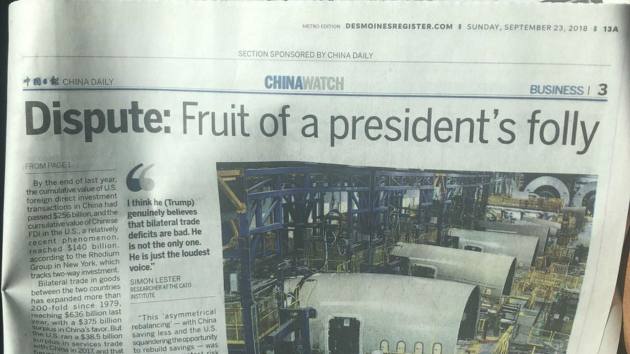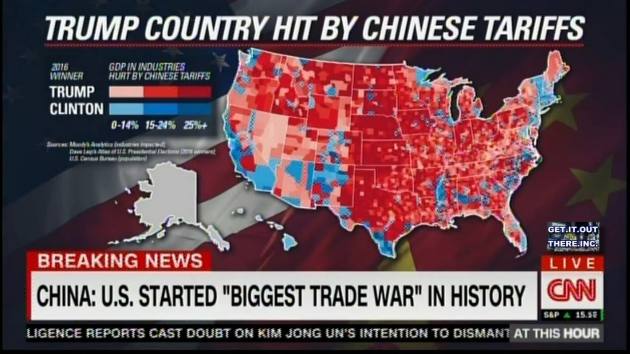NEWS ANALYSIS: Two years ago, Beijing was flying high. Well on its way to dominating the world. Or so it thought.
Sure, the newly elected American president had talked tough on trade, but so had other presidents in the past. Beijing was sure that this political novice—this capitalist—would be easily put in his place.
Just like Obama before him, they figured that Trump would quickly buckle under pressure from Wall Street, “K” Street, and the media as soon as he got in office.
They would ensure that his threat of tariffs never materialized. After all, they had learned over the past quarter century how easy it was to manipulate the American political system to their advantage.
Among themselves, China’s senior leaders sneeringly refer to our form of government as “moneybags democracy.” They themselves prefer bullets to ballots.
Had anyone but Trump won, the moneybags approach might have worked. Who knows what concessions she might have made on trade once Beijing-connected Chinese businessmen began dropping huge chunks of change into her favorite foundation?
To forestall Trump’s tariffs, China at first thought to take a similar approach.
Attempt to bribe Americans fails
A Chinese company with close ties to the ruling elite offered to “invest” $400 million in the real estate firm of the then-President-elect’s son-in-law. Beijing must have been surprised when the offer was rejected out of hand.
Beijing saw another opening when “Little Rocket Man” began stirring up trouble on the Korean Peninsula. They rushed in with an offer to mediate, obviously hoping to win favor—or at least buy time—with the new president on trade. Instead, Trump met directly with Kim Jong-un in Singapore and the missiles stopped flying.
Still, they were only just getting started. They mobilized their thousands of unpaid lobbyists, who stood on every Washington street corner chanting the mantra of “free trade.” But as cheap, subsidized Chinese-made goods continued to flood into America, Trump stayed focused on the bottom line.
China’s leaders also sought the help of their good friends on Wall Street, who have made billions servicing their investments. One of these even became the President’s chief economic advisor, and strongly advised his boss against tariffs. But Trump not only went ahead with the first round of levies, he promised more to come unless China changed its ways.
Election meddling
With the November midterms approaching, trade negotiations were stalled. But instead of backing down, Red Emperor Xi Jinping decided to double down. Since bribery and influence peddling hadn’t worked, it was time to administer—second-hand—a good, old-fashioned electoral drubbing to his American adversary. He would teach Trump a political lesson by weakening his political base.
His advisors came up with the idea of imposing tariffs targeting Trumpian states. While our initial round of tariffs on China were punitive—imposed as punishment on specific companies guilty of ripping off U.S. technology—China’s were overtly political. They targeted products from states like Iowa where Trump’s support was strong.
Beijing’s tariffs were, in other words, a tax on Trump’s political supporters that was deliberately intended to sway how they would vote in the upcoming elections. As such, it was a direct and brazen attack on American democracy by a foreign power.
Take the tariff on soybeans, for example. Beijing hoped to sway Republican-leaning farmers against Trump, costing his party seats in Congress and thereby weakening his resolve.
American farmers, it turns out, are made of sterner stuff than that. The soybean tactic didn’t work for, well, beans. Across the fifteen leading soybean producing congressional districts in the U.S., the Republicans didn’t lose a single seat.
If anything, China’s blatant interference in our election strengthened this President’s resolve, especially as it became clear that its actions extended well beyond political tariffs.
For example, as the election approached, anti-tariff, anti-Trump propaganda poured out of Chinese-owned radio and television stations in the U.S. The Trump administration retaliated by telling them to register as foreign agents.
Influence on American media
Paid advertising inserts even appeared in American newspapers, like the Des Moines Register, attacking the President’s trade

China paid for propaganda to be printed as “news” in liberal U.S. newspapers, including the Des Moines Register
policy. One of the most dictatorial governments in the world was undermining our democracy by abusing one of our most cherished freedoms, freedom of the press.
Taken together, China’s attempt to interfere in our election proved to be a major blunder. Beijing emptied out its bag of dirty tricks, and only succeeded in calling unwanted attention to itself.
Politically, Trump came out of the midterms in a stronger political position than ever, at least where dealing with China is concerned. Even Chuck Schumer and Nancy Pelosi now support getting tough with China.
As for the President’s resolve, it was never in doubt. Does anyone doubt that, unless China stops its predatory trade practices and buys more American goods, more tariffs are on the way in January?
Chinese economy now failing
While the American economy has easily weathered the “tariff war,” the same cannot be said of China’s.
Consumer confidence is down, the currency is weakening, bankruptcies are rippling through the country. The stock market is tanking and companies are fleeing the country. As The Epoch Times has reported, Apple suppliers, are already moving production to the friendlier—and tariff-free—climes of India, Vietnam, Mexico and the Philippines.
Once those companies relocate to countries with less corruption and often lower wages, they aren’t coming back. As Chinese economy continues to slow, the country faces a real danger of slipping into recession.
It wasn’t so long ago that Xi Jinping was bragging that his country was going “to dominate the hi-tech world by 2025.” Now, as Trump revealed during last week’s press conference, Beijing has offered to put the much-vaunted “China 2025” plan on ice.
Instead Chinese senior officials, in a desperate effort to shore up business confidence, are insisting to anyone who will listen that “China is not Turkey.”
From China as Number One to China is not Turkey in less than two years. That’s quick work, even for Donald J. Trump.
China has finally, for the first time, put a written offer on the table.
At the G-20 Summit in Buenos Aires on November 30th President Trump will meet with Xi Jinping to again talk trade. With levies of 25 percent looming in January, China’s leader faces a stark choice: trade fairly with the United States or suffer crippling tariffs.
Steven W. Mosher is the President of the Population Research Institute and an internationally recognized authority on China. He is the author of “Bully of Asia: Why China’s Dream is the New Threat to World Order.” He is also the author of numerous books on China, among them “Broken Earth: The Rural Chinese,” “A Mother’s Ordeal: One Woman’s Fight Against China’s One-Child Policy,” and “Hegemon: China’s Plan to Dominate Asia and the World,” as well as several edited volumes and hundreds of scholarly articles, editorials, and opinion pieces.
 Metro Voice News Celebrating Faith, Family & Community
Metro Voice News Celebrating Faith, Family & Community 








